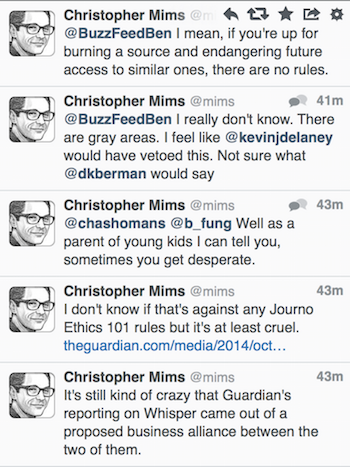The Guardian happened upon a huge story while discussing a journalism partnership with Whisper, whose social media app promises anonymity to users, encouraging them to share their secrets.
It turns out Whisper users aren’t so anonymous after all. The company tracks its users’ locations, even when they’ve turned off geolocation, according to The Guardian. It stores their messages—even deleted ones—indefinitely, despite promising to hold them only for “a brief period of time.” And then there’s this:
A team headed by Whisper’s editor-in-chief, Neetzan Zimmerman, is closely monitoring users it believes are potentially newsworthy, delving into the history of their activity on the app and tracking their movements through the mapping tool. Among the many users currently being targeted are military personnel and individuals claiming to work at Yahoo, Disney and on Capitol Hill…
Separately, Whisper has been following a user claiming to be a sex-obsessed lobbyist in Washington DC. The company’s tracking tools allow staff to monitor which areas of the capital the lobbyist visits. “He’s a guy that we’ll track for the rest of his life and he’ll have no idea we’ll be watching him,” the same Whisper executive said.
Where did The Guardian get the scoop? From the company itself, which had invited the paper’s reporters in to discuss how to further an extant editorial partnership.
It lucked into it, basically. I would have guessed anyone in their position would have reported it just as The Guardian did, and with no hesitation. Not quite.
It was bizarre to see a bit of backlash develop against The Guardian this weekend for reporting the story—particularly since much of the questioning came from journalists themselves.
Business Insider Editor and CEO Henry Blodget said this on Twitter:
Whisper looks bad here http://t.co/LNv9FiPhDr That said, doesn’t seem Guardian behaved ethically, either
— Henry Blodget (@hblodget) October 17, 2014
Wall Street Journal tech columnist Christopher Mims thought this out loud (ADDING: and I should say, later went the other way):

And Fortune senior editor Dan Primack chimed in:
@mathewi @hblodget @mims @NYTFridge that actually makes it worse. u don't go into a meeting w/ your partner, then report on it.
— danprimack (@danprimack) October 17, 2014
@ryanchittum @hblodget i agree with @hblodget that there is implicit privacy in that sort of meeting.
— danprimack (@danprimack) October 17, 2014
Then there was the Silicon Valley venture capitalist Keith Rabois, who said The Guardian‘s reporting was “tantamount to fraud” and called for “subpoenas of email and texts” from its reporters.
(I should note that I prompted several of these responses this weekend by criticizing this line of reasoning on Twitter. You can read the chain here.)
The questions focus on whether The Guardian somehow tricked Whisper into giving it the information or whether it violated an understood compact of business secrecy.
This is absurd. What The Guardian did was entirely ethical. Whisper told its reporters highly newsworthy facts about its own service. The information was all on the record. The Guardian reported it. It would have been a journalistic lapse for the paper not to have told readers what it had learned.
In fact, even had the sessions been off the record, or as Primack asserts, implicitly private, The Guardian would have had to give serious consideration to burning its sources if it couldn’t otherwise confirm the information. I’d argue that the right of the public to know that it is being gravely misled clearly outweighs the agreement by the paper not to publish that information.
Fortunately, we don’t have to worry about that hypothetical in this instance. But it’s troubling that journalists would look askance, even for a little while, at The Guardian‘s decision to report what it learned—on the record.
The ethical problems, meanwhile, are entirely in Whisper’s corner, and not just over how it handles its users’ data and how that differs from its promises to them. Whisper editor in chief Neetzan Zimmerman, the former viral wunderkind at Gawker, outright accused Guardian reporters Paul Lewis and Dominic Rushe of high journalistic fraud. Zimmerman said they were “lying” about much of the story’s information, particularly the quote about tracking the “sex-obsessed lobbyist.”
“It is a fabrication because it was never said, and no such person exists,” Zimmerman wrote on Twitter—an astonishingly reckless thing to say about two reporters with notes of a meeting that Zimmerman didn’t even attend.
When Whisper CEO Michael Heyward finally responded to the scandal on Sunday, The Guardian noted, accurately, that, “Unlike other Whisper representatives, who have strongly denied the disclosures, Heyward did not dispute the accuracy of the Guardian’s reporting.”
One fascinating thing about this story is how Whisper’s wounds are almost entirely self-inflicted. It brought in reporters to show what it could do for them, only to find them appalled at what it could do for them. And its top journalist accused two other journalists—falsely by all evidence—of fabricating a source and a quote.
The ethical questions are all on Whisper.
Ryan Chittum is a former Wall Street Journal reporter, and deputy editor of The Audit, CJR’s business section. If you see notable business journalism, give him a heads-up at rc2538@columbia.edu. Follow him on Twitter at @ryanchittum.
